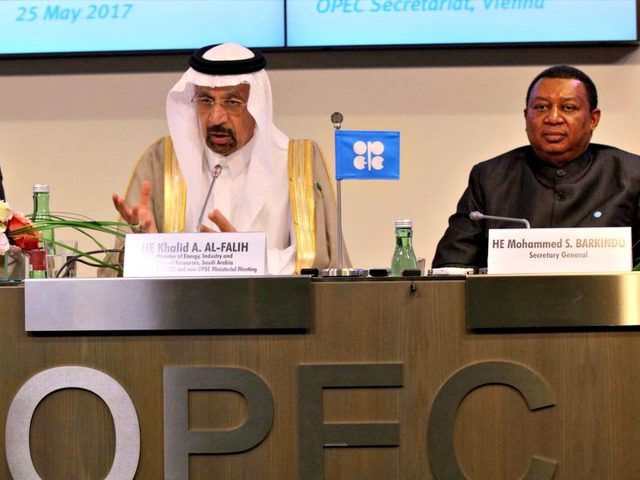A battle over oil production waged in recent weeks between Saudi Arabia and Russia ended after President Donald Trump helped broker a deal on Sunday that will slow the flow of oil during the coronavirus pandemic, stabilizing the global oil market and saving countless American jobs in the energy sector.
“The big Oil Deal with OPEC Plus is done,” Trump tweeted on Sunday. “This will save hundreds of thousands of energy jobs in the United States. I would like to thank and congratulate President Putin of Russia and King Salman of Saudi Arabia. I just spoke to them from the Oval Office. Great deal for all!”
“We have demonstrated that OPEC+ is up and alive. I’m more than happy with the deal,” Saudi Energy Minister Prince Abdulaziz bin Salman said in an online report on the Coinspeaker website.
OPEC (The Organization of the Petroleum Exporting Counties), when founded in 1960, consisted of the Islamic Republic of Iran, Iraq, Kuwait, Saudi Arabia, and Venezuela. OPEC Plus refers to 13 member nations that are now part the organization.
“Today’s crisis transcends the interests of any one nation and requires a swift and decisive response from us all,” U.S. Department of Energy Secretary Dan Brouillette said. “Failure to act has far reaching consequences to each of our economies. This is a time for all nations to seriously examine what each can do to correct the supply/demand imbalance.”
Energy industry leaders also praised the deal. Empowerment Alliance spokesperson Ian Prior said in a statement distributed to the press:
President Trump’s ‘Art of the Deal’ is as powerful as ever. Natural gas is going to be a cornerstone of our economic recovery and critical to providing all Americans with affordable energy. President Trump’s intervention to stabilize international oil markets will save countless American jobs and ensure that the global Covid-19 pandemic does not devastate our domestic energy industry and the economic boom that it powers.
The New York Times reported on the agreement, describing Trump’s role as someone who “prodded” the oil nations:
The plan by OPEC, Russia and other allied producers in a group known as OPEC Plus will slash 9.7 million barrels a day in May and June, or close to 10 percent of the world’s output.
While the planned cut is slightly smaller than a tentative pact reached last Thursday, the deal should bring some relief to struggling economies in the Middle East and Africa and global oil companies, including American firms that directly and indirectly employ 10 million workers. Analysts expect oil prices, which soared above $100 a barrel only six years ago, to remain below $40 for the foreseeable future. The American oil benchmark price was just over $23 a barrel on Sunday night.
It was not immediately clear if the Trump administration made a formal commitment to cut production in the United States, but with prices plummeting, many companies in the country have already reduced output. There is no international mechanism to strictly enforce such production agreements and cheating is common.
“This is at least a temporary relief for the energy industry and for the global economy,” Per Magnus Nysveen, head of analysis for Rystad Energy, a Norwegian consulting company, said in the Times report. “The industry is too big to be left to fail.”
“The change in course should give a lifeline to American companies as they invest far less in exploration and production,” the Times reported.
Amy Myers Jaffe, an energy and Middle East expert at the Council on Foreign Relations, said in the Times report:
Hopefully, the American oil industry has avoided a worst-case scenario,” Amy Myers Jaffe, an energy and Middle East expert at the Council on Foreign Relations, said in the Times report. “There still will be bankruptcies, but for the time being, the fears that there would be a wholesale destruction of the industry can now be put aside, because the worst of the price war has passed.
“The agreement announced on Sunday will taper into a 7.7-million-barrel-a-day cut from July to December and then to 5.8 million barrels a day from January 2021 to April 2022,” the Times reported.
Follow Penny Starr on Twitter

COMMENTS
Please let us know if you're having issues with commenting.